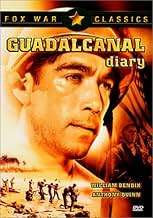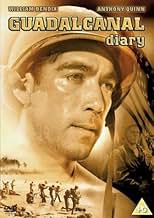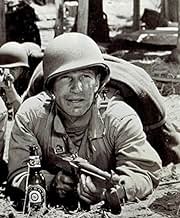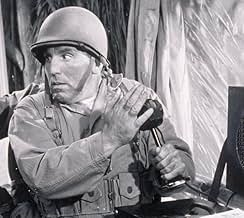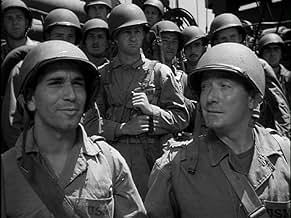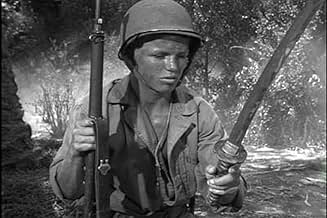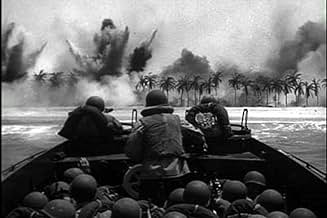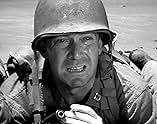IMDb RATING
6.7/10
2.4K
YOUR RATING
The story of a large U.S. Marines invasion task force bound for Guadalcanal in the Solomon Islands in 1942.The story of a large U.S. Marines invasion task force bound for Guadalcanal in the Solomon Islands in 1942.The story of a large U.S. Marines invasion task force bound for Guadalcanal in the Solomon Islands in 1942.
- Awards
- 1 win total
Eddie Acuff
- Pvt. Tex Mcllvoy
- (uncredited)
Warren Ashe
- Col. Morton
- (uncredited)
Martin Black
- Marine
- (uncredited)
Marion Carl
- Marine Pilot
- (uncredited)
Harry Carter
- Dispatch Officer
- (uncredited)
Tom Dawson
- Captain
- (uncredited)
Featured reviews
This is a tremendous World War II film with amazing performances. The director, Lewis Seiler, and the writer of the screenplay, Lamar Trotti, must have really been on their toes to come up with this little gem from a book by Richard Tregaskis. The quality of "Guadalcanal" is amazing from the special effects and location shots to the cinematography and the dialogue. Sometimes less is more and this movie demonstrates that in portraying the violence of war realistically without being extremely graphic. The only minor flaw I saw in the special effects was when a few soldiers were killed by grenades or bombs and they seemed to fall over from the blast a tad bit too quickly. This movie uses an ensemble cast of actors to tell the story of a platoon of U.S. marines sent to Guadalcanal to fight the Japanese in the South Pacific Ocean. The focus is not as much on the fighting and battles as it is on the men themselves in the context of war, although there are several terrific scenes of fighting and skirmishes that propel the movie along at an excellent pace. "Guadalcanal" is in glorious black and white film and is crisp and clear. Many scenes from the movie are so vivid that they have lingered in my mind long after watching the movie. I can recall vividly the palm trees on the beach, the sound of the men singing, the men lounging on the deck of the ship, Japanese soldiers being blown up in a cave and falling out of trees, the faces and expressions of the men and on and on. This movie not only stood up to a second viewing but also seemed even better the second time around. I can't praise the actors enough who breathe life into this movie and who make their characters so easy to get to know that this sixty year old movie seems like it was made yesterday. Watch this movie and see how these men respond to battle in "Guadalcanal." It's an experience not to be missed. I highly recommend it and give it a 92/100. I purchased the DVD for my collection.
War correspondent Richard Tregaskis's memoir of the battle for the strategic island of Guadalcanal provides the basis of this film with a solid cast of players. Tregaskis himself is played unnamed in the film by Reed Hadley, who's rich narrative voice greatly enhances the film.
Guadalcanal Diary unfortunately has not aged well. It was made the year after Guadalcanal, together with its key airfield Henderson Field was finally cleared of Japanese. It was a slow, steady war of attrition, on both land and sea. While this film concerns the Marines on the island, at sea our navy was battling with the Japanese Navy in what was euphemistically called 'the slot' which was a channel that bisected the Solomon chain neatly in half. Our Marines dealt not only with the Japanese on the ground, but from Naval bombardment from the Japanese Fleet whenever they snuck in. The Japanese positions were in the jungle and further in land and were less affected by off shore shelling from us.
All the types you expect from World War II are there, the tough Marine sergeant Lloyd Nolan, the Marine from Brooklyn, where else, William Bendix, the young recruit, Richard Jaeckel in his first film playing a teenager when he actually was one. Preston Foster plays the Catholic chaplain, a wise and compassionate fellow who once played football for Notre Dame. It's a page out of Pat O'Brien's Father Duffy portrayal from The Fighting 69th and Foster is the best one in the film.
Sad to say that the Marines do refer to the Japanese as less than human on a few occasions. It's why the film doesn't age well, especially after Clint Eastwood's latest films about the Pacific Theater.
Guadalcanal Diary still is a good film for those who are fans of World War II films made in the World War II years.
Guadalcanal Diary unfortunately has not aged well. It was made the year after Guadalcanal, together with its key airfield Henderson Field was finally cleared of Japanese. It was a slow, steady war of attrition, on both land and sea. While this film concerns the Marines on the island, at sea our navy was battling with the Japanese Navy in what was euphemistically called 'the slot' which was a channel that bisected the Solomon chain neatly in half. Our Marines dealt not only with the Japanese on the ground, but from Naval bombardment from the Japanese Fleet whenever they snuck in. The Japanese positions were in the jungle and further in land and were less affected by off shore shelling from us.
All the types you expect from World War II are there, the tough Marine sergeant Lloyd Nolan, the Marine from Brooklyn, where else, William Bendix, the young recruit, Richard Jaeckel in his first film playing a teenager when he actually was one. Preston Foster plays the Catholic chaplain, a wise and compassionate fellow who once played football for Notre Dame. It's a page out of Pat O'Brien's Father Duffy portrayal from The Fighting 69th and Foster is the best one in the film.
Sad to say that the Marines do refer to the Japanese as less than human on a few occasions. It's why the film doesn't age well, especially after Clint Eastwood's latest films about the Pacific Theater.
Guadalcanal Diary still is a good film for those who are fans of World War II films made in the World War II years.
I grew up watching World War 2 movies with my Father (WW 2 US Army Combat engineer), so I can say that I know a lot about the genre. This movie is one of the better ones. I rate it a 7 on a 10 point scale. Some people think that the "gee-wheez" dialog is not real of what the soldiers would say. They are right, however we must keep in mind that this movie was made in the 40's for people living in the 1940's and not the 2000's. In the 1940's swearing and tough real talk was just as common as it is today, but there was no need for them fill a movie up with such talk. The movies were made to stand on it's story merit and not be just a swear fest based "roller coaster ride" we have today. Taken in context, the movie hits home a very common point for movie made during the war. The point is that our boys who are like all of us in America (1940's view on the world) have it rough, they need our support, but they will win. Note movies made after the war have a different viewpoint.
The island this film is named after is not big as islands go. Ninety miles long by roughly, twenty-odd miles wide, it lay roughly, north west by south east. The high point of Guadalcanal rose up to about 8000 feet; covered with low cloud and forest.
This film then, based on the book of the same name, and written by the war correspondent, Richard Tregaskis is, in my opinion, a better movie than, "The Sands of Iwo Jima", when it comes to paying tribute to the war record of the U.S. Marine Corps in World War Two.
I liked the opening scenes aboard the troop transport. A pleasant, and lazy Sunday morning. A religious service and hymn singing held on deck. Navy Chaplain, Father Donnelly (Preston Foster), presiding. Lloyd Nolan, as Sergeant Malone, an often under-rated actor in my opinion, wisecracking with 'Taxi' Potts, a Dodgers fanatic played by the always-likable. William Bendix. There is Richard Conte as Captain Davis. Anthony Quinn, forever a Latin-type character, Private Alvarez. Schoolboy-faced Richard Jeackel in his first-ever role, after being hoisted up from the studio mail room at Twentieth Fox. Minor Watson as Colonel Grayson, was always a reliable father-like figure who, when he landed on the beach, said this operation was unlikely to be any picnic. How right he would turn out to be. What added a shine to this film from the opening scenes was Reed Hadley narrating the story of the campaign as it unfolded, as if it was Richard Tregaskis himself. Hadley's narration seems to make the atmosphere of the film gel perfectly. A king of semi-documentary realism, if you will.
The first prisoners to be brought in are trembling, half starved in appearance, and in fear of their lives. 'Are these the monkeys were fighting?' asks Lionel Stander, as Sergeant Butch. This is the first impression they get of what passes to the marines as Japanese soldiers. It will turn out to be a false impression, soon enough. As they push further inland, the realisation soon grows that occupying this far from small, God-forsaken island is going to be no pushover. Colonel Grayson's 'no picnic' turns out to be an ugly truism.
With the Matanikau expedition a tragic failure, after landing from the sea, the realisation they're up against a determined and ferocious enemy, sinks deeper. Private Alvarez is the sole survivor from Matinikau, making it back to his own lines. Shaking with a combination of shock and vengeful anger, he recalls the other marines being picked off and bayoneted as he heads back and dives into the surf to escape.
With the second assault on Matinikau, the marine's blood is up, and they're out for blood. The Jap is taken on at his own game. The gloves are off and the chips down. They fight ruthlessness and cunning with same. And overwhelm a fanatical enemy.
In the closing scenes, the marines are relieved by fresh but yet-to-be-tried army infantrymen straight off a troop transport. One of the GI's calls out to the blooded veterans, 'What's it like?' A tired-looking Sergeant Malone answers, 'Pretty rugged, son'. For Malone, like the rest of the marines who entered the jaws of conflict and survived, they look older, and wiser. And were not found wanting. There it is then, a film that grandly commemorates the old, young men of a single platoon of the 1st Marine Division. Names on a map unknown, now entered into the history books, and the Marine Corps Hall of Fame. Matanikau, Lunga Point, Tenaru River, Bloody Ridge, Point Cruz. All fought over for a airstrip; named after Lofton Henderson, a distinguished marine pilot from the Battle of Midway.
Guadalcanal is not a name, but an emotion. So said Professor Samual Elliot Morison, the U.S. Naval Historian. How true. The Japanese were not the only enemy. There was dengue fever, malarial swamp, and humidity to sap the energy, all wrapped around with a foul-smelling jungle. There was a epitaph found at the Marine Cemetery at Lunga Point. It would have been appropriate to have displayed it along with the end credits of this film. It goes:-
That when he goes to heaven./ To Saint Peter he will tell./ Another marine reporting Sir./ I have served my time in hell.
How truthfull that piece of poetry turned out to be.
This film then, based on the book of the same name, and written by the war correspondent, Richard Tregaskis is, in my opinion, a better movie than, "The Sands of Iwo Jima", when it comes to paying tribute to the war record of the U.S. Marine Corps in World War Two.
I liked the opening scenes aboard the troop transport. A pleasant, and lazy Sunday morning. A religious service and hymn singing held on deck. Navy Chaplain, Father Donnelly (Preston Foster), presiding. Lloyd Nolan, as Sergeant Malone, an often under-rated actor in my opinion, wisecracking with 'Taxi' Potts, a Dodgers fanatic played by the always-likable. William Bendix. There is Richard Conte as Captain Davis. Anthony Quinn, forever a Latin-type character, Private Alvarez. Schoolboy-faced Richard Jeackel in his first-ever role, after being hoisted up from the studio mail room at Twentieth Fox. Minor Watson as Colonel Grayson, was always a reliable father-like figure who, when he landed on the beach, said this operation was unlikely to be any picnic. How right he would turn out to be. What added a shine to this film from the opening scenes was Reed Hadley narrating the story of the campaign as it unfolded, as if it was Richard Tregaskis himself. Hadley's narration seems to make the atmosphere of the film gel perfectly. A king of semi-documentary realism, if you will.
The first prisoners to be brought in are trembling, half starved in appearance, and in fear of their lives. 'Are these the monkeys were fighting?' asks Lionel Stander, as Sergeant Butch. This is the first impression they get of what passes to the marines as Japanese soldiers. It will turn out to be a false impression, soon enough. As they push further inland, the realisation soon grows that occupying this far from small, God-forsaken island is going to be no pushover. Colonel Grayson's 'no picnic' turns out to be an ugly truism.
With the Matanikau expedition a tragic failure, after landing from the sea, the realisation they're up against a determined and ferocious enemy, sinks deeper. Private Alvarez is the sole survivor from Matinikau, making it back to his own lines. Shaking with a combination of shock and vengeful anger, he recalls the other marines being picked off and bayoneted as he heads back and dives into the surf to escape.
With the second assault on Matinikau, the marine's blood is up, and they're out for blood. The Jap is taken on at his own game. The gloves are off and the chips down. They fight ruthlessness and cunning with same. And overwhelm a fanatical enemy.
In the closing scenes, the marines are relieved by fresh but yet-to-be-tried army infantrymen straight off a troop transport. One of the GI's calls out to the blooded veterans, 'What's it like?' A tired-looking Sergeant Malone answers, 'Pretty rugged, son'. For Malone, like the rest of the marines who entered the jaws of conflict and survived, they look older, and wiser. And were not found wanting. There it is then, a film that grandly commemorates the old, young men of a single platoon of the 1st Marine Division. Names on a map unknown, now entered into the history books, and the Marine Corps Hall of Fame. Matanikau, Lunga Point, Tenaru River, Bloody Ridge, Point Cruz. All fought over for a airstrip; named after Lofton Henderson, a distinguished marine pilot from the Battle of Midway.
Guadalcanal is not a name, but an emotion. So said Professor Samual Elliot Morison, the U.S. Naval Historian. How true. The Japanese were not the only enemy. There was dengue fever, malarial swamp, and humidity to sap the energy, all wrapped around with a foul-smelling jungle. There was a epitaph found at the Marine Cemetery at Lunga Point. It would have been appropriate to have displayed it along with the end credits of this film. It goes:-
That when he goes to heaven./ To Saint Peter he will tell./ Another marine reporting Sir./ I have served my time in hell.
How truthfull that piece of poetry turned out to be.
This is one of the better (and most topical) of Hollywood’s wartime efforts, but which seems to have been largely overlooked among the surplus of such films – possibly because it was helmed by journeyman director Seiler.
Still, the handling is entirely professional and the film makes the most of a good script by Lamar Trotti – peopled with believable characters ably portrayed by a fine cast (Preston Foster, Lloyd Nolan, Richard Conte, Anthony Quinn, Richard Jaeckel). The requisite comic relief provided by William Bendix and Lionel Stander is slightly overstated…but, then, Bendix delivers the film’s most moving speech towards the end.
The film – unavoidably jingoistic but, at the same time, realistic i.e. thankfully free of gung-ho heroics – balances taut action sequences (culminating in the so-called “Great Offensive”) with a handful of undeniably powerful, lingering images (particularly the line-up of dead U.S. marines ambushed on a beach by the devious Japanese forces). I’ll be following this with Cornel Wilde’s well-regarded BEACH RED (1967), which also deals with WWII combat in the Pacific; besides, I also own – but have yet to watch – the R2 DVD of Lewis Milestone’s contemporaneous THE PURPLE HEART (1944), which tackles similar events from a unique perspective.
Still, the handling is entirely professional and the film makes the most of a good script by Lamar Trotti – peopled with believable characters ably portrayed by a fine cast (Preston Foster, Lloyd Nolan, Richard Conte, Anthony Quinn, Richard Jaeckel). The requisite comic relief provided by William Bendix and Lionel Stander is slightly overstated…but, then, Bendix delivers the film’s most moving speech towards the end.
The film – unavoidably jingoistic but, at the same time, realistic i.e. thankfully free of gung-ho heroics – balances taut action sequences (culminating in the so-called “Great Offensive”) with a handful of undeniably powerful, lingering images (particularly the line-up of dead U.S. marines ambushed on a beach by the devious Japanese forces). I’ll be following this with Cornel Wilde’s well-regarded BEACH RED (1967), which also deals with WWII combat in the Pacific; besides, I also own – but have yet to watch – the R2 DVD of Lewis Milestone’s contemporaneous THE PURPLE HEART (1944), which tackles similar events from a unique perspective.
Did you know
- TriviaMarine Corps Capt. Marion Carl, a multi-ace (18.5 air victories), makes an appearance as a Marine Corps pilot. Capt. Carl wears his baseball cap with the bill pointed skyward and makes the comment, "Don't look now, fellas, but a truck of gas just came on the field." Capt. Carl was a survivor of the Battle of Midway and the air campaign for Guadalcanal in 1942. He was awarded 2 Navy Crosses for his actions at Midway and Guadalcanal. Sadly, on June 28, 1998, he was murdered in his Oregon home by a home intruder.
- GoofsWhen Japanese snipers hid in the tops of trees, they tied themselves into their positions. They did not fall out of the trees when shot.
- Quotes
Cpl. Aloysius T. 'Taxi' Potts: [In dugout waiting out a heavy artillery barrage] I don't mind the one with my name on it. It's the one that says, 'To whom it may concern' that I don't like.
[after the barrage increases]
Cpl. Aloysius T. 'Taxi' Potts: They're throwing everything at us but the kitchen stove.
Gunnery Sgt. Hook Malone: [after an even louder explosion] That's the stove now!
- Crazy creditsThe film's opening prologue in the preface of a book states: A new chapter in the history of America by a correspondent who landed on Guadalcanal with the first detachment of United States Marines.
- ConnectionsEdited into Tarawa, tête de pont (1958)
- SoundtracksMarine Hymn
(uncredited)
Music by Jacques Offenbach from "Geneviève de Brabant"
Played during the opening credits and occasionally in the score
- How long is Guadalcanal Diary?Powered by Alexa
Details
- Runtime
- 1h 33m(93 min)
- Color
- Aspect ratio
- 1.37 : 1
Contribute to this page
Suggest an edit or add missing content


